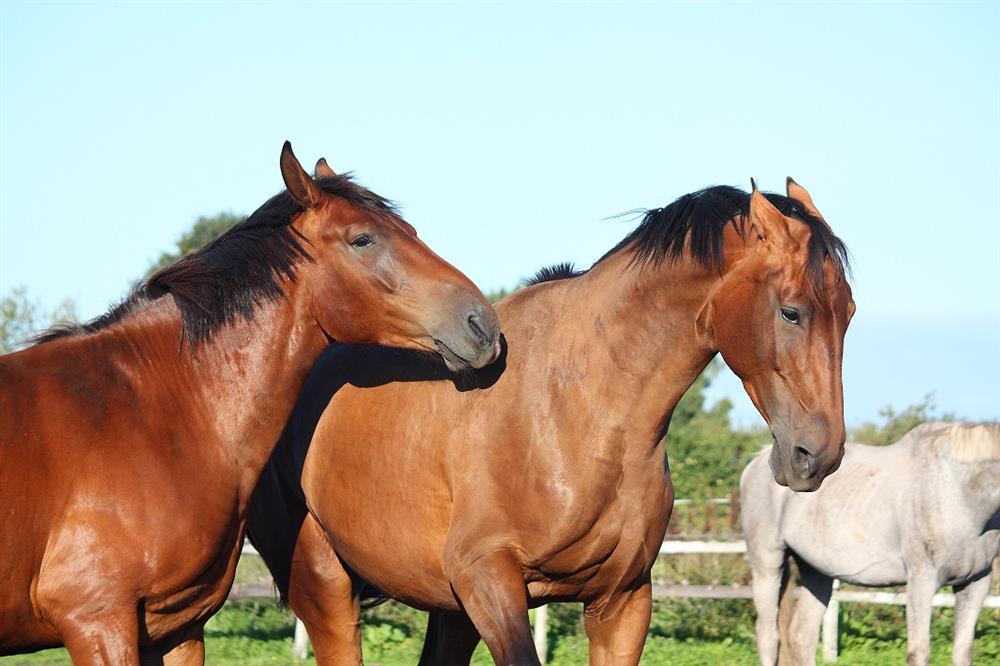Have you got a 'moody mare'?
If you’re involved with horses, it is likely you have heard the term ‘moody mare’. Unfortunately, mares are often given this title for displaying unsociable behaviours such as reluctance to go forward, tail swishing, biting, kicking and squealing, both at other horses and humans alike. Often, these behaviours are more apparent around March/April time as the seasons change and the daylight hours become longer. Horses behaving this way can be challenging for their handlers and can negatively impact on their performance.

The mare’s reproductive cycle
Most mares are seasonally polyoestrous, which means that their reproductive cycles depend on the time of year, with the mare’s breeding season typically covering the months between March to October. Daylight hours are primarily what regulates a mare’s reproductive activity, and the pituitary gland is responsible for producing the hormones that stimulate the increased ovarian activity in the spring.
During the winter time, the mare will be in a non-reproductive season known as ‘anoestrus’ when her ovaries are inactive, and it is unlikely she’ll display any ‘mare-ish’ behaviour. This is because a mare’s gestation period is 11 months, so naturally a mare won’t cycle over the winter months in order to avoid foaling at a similar time a year later, when the weather is likely to be very challenging for a new born foal.
The average length of the mare’s oestrus cycle is 21 days. The season, or ‘in-heat’ period typically lasts 5-7 days and behavioural changes are most commonly worse at this time as a higher level of oestrogen is produced and ovarian follicles increase in size. This is when she will be fertile and most receptive to a stallion. Following this ‘in heat’ period, she’ll be in dioestrus for 14-16 days after ovulation and this is when her behaviour should return to normal.
What else could be causing this behaviour?
Your mare may be displaying undesirable behaviour for reasons other than her hormonal changes. It is useful to consult your vet, who will perform a physical examination to rule out any other underlying issues that may have similar symptoms. These could include back pain, gastric ulcers, lameness or urinary tract infections to name a few, and all of which require specialised treatment. A healthy, comfortable horse is a happy one, so it is important to seek advice if you are at all concerned about your horse. More information on issues that could cause your mare’s abnormal behaviour can be found here.
Nutritional support
Many ‘moody-mare’ owners feed a supplement to support their mare’s hormones in an aim to ease the aggressive or highly-strung behaviour.
Hormonease is a natural supplement providing herbs to help support normal hormone balance. These herbs including Chastetree berries, Red clover and Black cohosh, which are renowned for their positive effects on the pituitary gland to help stabilise and manage oestrogen production.
Phytoestrogens are naturally occurring compounds within the ingredients. These work effectively to trick the body into thinking it has produced more of certain hormones than it actually has, therefore reducing the production of hormones, resulting in fewer behavioural changes. This occurs when the phytoestrogens bind to oestrogen receptors within the horse’s body, taking the place of oestrogen and causing a milder effect on the body than the oestrogen would cause.
Similarly, Black cohosh has antiestrogenic properties which reduces levels of the luteinizing hormone responsible for inducing ovulation and has been traditionally used in both humans and animals to ease symptoms of menstruation. Red clover flowers have also been shown to help with maintaining a hormone balance by preventing hormone spikes.
Hormonease is safe to be fed long term and to competition horses.
Alternative management methods
Your vet may be able to offer methods to alter your mare’s cycle and suppress the hormonal behaviour in some cases.
Regumate™ is a popular choice for challenging mares as it is a synthetic version of the dominant hormone progesterone and can be used to stop the mare coming into season. It is effective and easy to use, however expensive and care must be taken when handling it as it can affect the human reproductive cycle if it comes into contact with skin.
Your vet may also be able to alter the timings of your mare’s cycle to avoid competition by administration of prostaglandin which can be used if the mare is mid-way through her cycle. Speak to your vet for their advice on suppressing the oestrus cycle of your mare.

